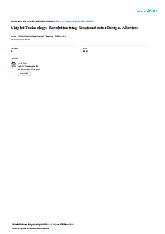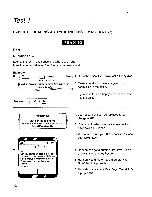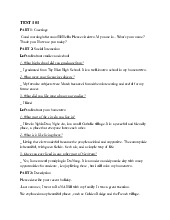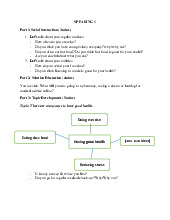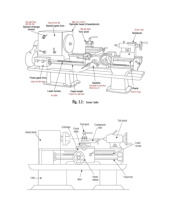








Preview text:
UNIT 2. HUMANS AND THE ENVIRONMENT- Test 1
I. Find the word whose underlined part differs from the other three in pronunciation in each of the following questions. 1. A. recycle B. clean C. car D. cause 2. A. place B. plan C. habit D. attract 3. A. prevent B. energy C. attend D. encourage 4. A. protect B. provide C. model D. collect 5. A. heat B. situation C. turn D. sustainable 6. A. litter B. issue C. device D. pick 7. A. raw B. organ C. appliance D. adopt 8. A. compulsory B. human C. bus D. rubbish 9. A. waste B. search C. support D. cause 10. A. plastic B. emission C. estimate D. remind
II. Find the word that differs from the other three in the position of stress in each of the following questions. 1. A. explosion B. chemical C. natural D. organise 2. A. reduce B. litter C. event D. improve 3. A. lifestyle B. issue C. meeting D. adopt 4. A. energy B. neighbourhood C. attention D. regular 5. A. station B. global C. destroy D. water 6. A. attend B. damage C. footprint D. welcome 7. A. household B. protect C. friendly D. public 8. A. model B. habit C. product D. remind 9. A. harmful B. plastic C. bottled D. collect 10. A. temperature B. activity C. sustainable D. electrical
III. Mark the letter A, B, C, or D to indicate the word(s) CLOSEST in meaning to the underlined word(s) in
each of the following sentences.
1. Too much CO2 in the atmosphere can lead to increasing global temperatures and air pollution, and destroy the natural world. A. result in B. involve in C. result from D. turn up
2. It's not difficult to reduce your carbon footprint. You can do it by making your daily activities eco-friendly. A. climate-friendly B. unfriendly C. kindly D. environmentally-friendly
3. Walking or cycling are activities that can help reduce your carbon footprint and your impact on the environment. A. influence B. consequence C. effect D. circumstance
4. A carbon footprint is the total amount of C02 produced by human activities and includes the emissions of other greenhouse gases. A. discharges B. controls C. reductions D. expansion
5. Modern household appliances make housework much easier. A. Current B. Contemporary C. Recent D. Up-to-date
IV. Mark the letter A, B, C, or D to indicate the word(s) OPPOSITE in meaning to the underlined word(s) in
each of the following sentences.
1. Large carbon footprint is a reason for destroying the natural world. A. gentle B. artificial C. pure D. uncommon
2. Small changes in your daily habits can help reduce the carbon footprint you produce. A. lower B. increase C. rise D. improve
3. More people adopt a green lifestyle. It is a choice we make to change to a greener and more sustainable lifestyle. A. continual B. viable C. untenable D. wasteful
4. Recycling as much as possible reduces the need to collect new raw materials and protects natural resources. A. unprocessed B. well-done C. cooked D. prepared
5. Organic methods help reduce the use of harmful chemicals in food, which is better for our health. A. fortunate B. profitable C. favorable D. helpful
V. Mark the letter A, B, C, or D to indicate the correct answer to each of the following sentences. 1. I'm
reduce my carbon footprint but I don’t know what to do, so I join the club. A. keen on B. keen to C. used to D. used for 2. The club’s
is to improve our environment and encourage people to adopt a greener lifestyle. A. wish B. desire C. purpose D. aim
3. We’ll organise more activities to raise local people’s of environmental issues. A. awareness B. aware C. unaware D. unawareness
4. Don’t throw away your used household items, but and recycle them. A. reduce B. produce C. sort D. break 5. Globally, the
carbon footprint per person is more than 4 tons per year. A. medium B. average C. personal D. estimated 6. Instead of using your
car or motorbike, you should use public transport, walk or cycle as much as possible. A. particular B. public C. common D. personal 7. Everyone should
all electrical appliances before going out of the room to save energy. A. turn off B. turn on C. turn up D. turn down
8. She’s interested in listening to music loudly, so she the radio. A. turned off B. turned on C. turned up D. turned down
9. The park is dirty because many people litter on the paths. A. make B. drop C. keep D. hold 10. The club is
by the Youth Union in my school. A. cleaned up B. picked up C. based on D. set up 11. I think we are all able
a lot of things to protect our environment. A. to do B. do C. doing D. to doing 12. Students are
to pick up litter that they see on the ground. A. raised B. attracted C. reminded D. decided
13. Eco-friendly car models always attract great at exhibitions. A. attend B. attention C. attentive D. attentively 14. One of the most important of energy is the Sun. A. resources B. bases C. roots D. sources 15. They have already
a decision that they are going to buy a new house next month. A. had B. made C. taken D. got 11. This beautiful dress
for me by my mother last week. A. is made B. was made C. will be made D. has been made 12. Those flowers and plants every day. A. will be watered B. are watered C. were watered D. are being watered 13. Hundreds of films by CGV Cinemas since January. A. have showed B. have been showed C. were showed D. showed 14. "When ?” - " In 1876." A. the telephone was invented C. did the telephone invented B. was the telephone invented D. did the telephone invent
15. The preparation for the graduation ceremony by the time the students . A. had been finished - came C. had finished - came B. have been finished - came D. will have finished - come
16. Do you hear the footsteps behind us ? I think we . A. were being followed C. are followed B. are being followed D. were followed 17. My computer
by my brother at this time last night. A. was being repaired B. was repairing C. is repairing D. was repaired 18. This work
by the marketing team next Monday. A. will be done
B. will have been done C. will do D. is done
19. A lot of clean-up activities by our club this weekend. A. will have organized B. is being organized C. are going to be organized D. will be organizing 20. These reports must by the manager. A. have checked B. be checking C. be checked D. check
10. They recommend that we bring a bag when we go shopping. A. usable B. reuse C. reusable D. useful
11. He started to cycle to work
driving his own car last week. A. in spite of B. instead of C. due to D. because of
12. Scientists said that it took years for the material to into small pieces. A. break down B. break up C. turn down D. turn up
13. Household appliances should be
to save energy and avoid dangerous situations. A. turned off B. turned on C. turned up D. turned down
14. Each of our small habits, such as leaving the room with the lights on, wastes . A. electric B. electrical C. electrically D. electricity
15. We shouldn't drop litter in the street because this will make the street dirty and the environment. A. polluted B. pollution C. pollute D. polluting 16. Rubbish will be
in the central market and in the streets around the schools. A. pick up B. picked up C. to pick up D. picking up 17. The students are keen on
the voluntary activities because they can make new friends. A. join B. to join C. joining D. joined
18. We can improve the environment in our school in many ways and even small actions can make a big . A. improvement B. difference C. diversity D. contrast 19. The
of greenhouse gases can cause climate change. A. estimation B. diffusion C. ejection D. emission
20. Too much CO2 in the atmosphere can lead
increasing global temperatures and air pollution, and destroy the natural world. A. for B. at C. to D. from
21. Following the school's regulations is
for every teacher and student. They are not allowed to be late for school. A. compulsory B. helpful C. good D. useful
22. These simple activities can help reduce your carbon footprint and your impact the environment. A. with B. about C. from D. on
23. Do you know the oldest type of
energy is the biomass that is derived from plant matter? A. remarkable B. significant C. sustainable D. affordable 24. We buy
food at the farmers' market. It costs a little bit more, but we think it's better for our health. A. organic B. non-organic C. healthy D. wealthy
25. In the UK, poor air quality is responsible some 40,000 deaths each year. A. to B. for C. in D. with
26. Sustainable energy is energy that
the needs of the present generations. A. meets B. takes C. makes D. picks
27. We can’t go along here because the road . A. is repairing B. is repaired C. is being repaired D. repairs 28.
car models always attract great attention at exhibitions. A. Eco – friendly B. Wealthy C. Passionate D. Portable 29. Remember to turn off your when they are not used. A. household chores
B. household appliances C. household finance D. invitations
30. Small changes in your daily habits can help reduce the you produce. A. carbon footprint B. footsteps C. issues D. trouble 31. One of the most important of energy is the sun. A. resources B. sources C. means D. kinds 32. Students are reminded to
litter that they see on the ground. A. turn off B. put off C. pick up D. turn up 33. Switching to
light bulb is one way to protect the environment. A. energy-expending B. energy-wasting C. energy-saving D. energy-lacking 34. More people
a green lifestyle because it is good for the environment. A. adopt B. conclude C. compose D. create 35. A modern hospital in this town soon. A. will be built B. will build C. will built D. will be build 36. You should cut down
electricity usage to reduce your carbon footprint. A. in B. on C. to D. for 37. Switching to
eco light bulb is one way to protect the environment. A. energy-wasting B. energy-expending C. energy-lacking D. energy-saving
38. I never leave any electrical appliances on standby and I think it is a good way to energy in the home. A. take care of B. use C. keep D. conserve 39. Money
to the homeless shelter by Larry. A. donated B. was donating C. was donated D. donates 40. This house is going by my mother A. sold B. to be sold C. to sold D. to sell
VI. Write the words from the box below the pictures. plastic litter appliance explosion emission collection 1. 2. 3. 4. 5. 6.
VII. Choose the correct word to complete each sentence.
1. The damage / support caused by industrial pollution is an issue that demands immediate attention.
2. During the cultural ceremony / lifestyle, the community discussed ways to protect their local area.
3. The environmental event / issue attracted a large crowd and helped raise people’s awareness of environmental protection.
4. The scientist gave an informative area / presentation on renewable energy technologies.
5. By using energy-efficient appliances, my family significantly reduced our monthly emission / energy bills.
6. Environmental education is important to raise awareness / collection about environmental issues.
7. Recycling paper and cardboard household items / devices helps protect valuable resources.
8. Protecting natural resources / reports is essential for future generations.
9. Human changes / activities, such as deforestation and industrial emissions, are a major cause of climate change.
10. Waste collection / station is essential for preventing pollution and ensuring proper disposal of materials.
11. Small changes / impacts in daily habits can make a big difference in environmental protection.
12. Using raw situations / materials wisely helps keep our environment clean and healthy.
VIII. Match the phrases on the left with their meanings on the right. 1. set up a. to collect 2. turn off
b. to arrange for an event or activity to happen 3. clean up
c. to get rid of something you do not want any more 4. pick up
d. to stop a device with a button or a switch 5. cut down on e. to find something 6. break down
f. to divide something into smaller parts 7. throw away
g. to use or do less of something 8. search for
h. to make a person or place clean and tidy
IX. Mark the letter A, B, C or D to indicate the correct answer to each of the following questions
1. Adopting green technologies can help the environment. A. improve B. attend C. organise D. raise
2. Many households have chosen to
a greener lifestyle to reduce their carbon footprint. A. encourage B. reduce C. achieve D. adopt
3. Sustainable farming practices aim to
food without causing harm to the environment. A. collect B. produce C. attract D. remind
4. Effective waste collection can
pollution and protect the environment. A. provide B. revise C. prevent D. taste
5. Volunteers work together to
litter and keep public spaces clean. A. water B. pollute C. calculate D. collect
6. Community leaders came together to
a plan for the protection of the local ecosystem. A. base B. make C. plant D. drop
7. The event in the park helped
attention to environmental issues. A. attract B. part C. save D. cause
8. A green lifestyle involves using eco-friendly products and carbon footprint. A. revising B. reusing C. recycling D. reducing
X. Match each word on the left with the word that has OPPOSITE meaning on the right. 1. harmful a. local 2. natural b. unenthusiastic 3. planned c. clean 4. keen d. beneficial 5. compulsory e. artificial 6. global f. new 7. used g. optional 8. polluted h. unprepared
XI. Complete each sentence using the correct form of the word in brackets. 1. Avoiding using
chemicals in farming practices is important for maintaining a
healthy and natural ecosystem. (HARM) 2. Recycling
materials helps conserve resources and reduce waste in the environment. (USE) 3. Using
water contributes to plastic waste. (BOTTLE)
4. Using energy-efficient appliances can reduce the use of . (ELECTRICAL) 5.
efforts are needed to address climate change and its impact on the environment. (GLOBE)
6. Taking small steps like recycling and reducing plastic waste can have a positive impact on protection. (ENVIRONMENT) 7. It’s important to
paper, plastic, and glass regularly to reduce waste. (RECYCLING) 8. Environmental
play a vital role in supporting sustainable practices. (ORGANISE)
9. People are encouraged to use
shopping bags when buying food and things. (REUSE) 10. The
project aims to restore the environment and prevent deforestation. (PLAN)
XII. Complete each sentence with the correct form of the verb in brackets (will or be going to)
1. I have made my decision. I
all my plastic bottles to reduce the amount of plastic waste. (RECYCLE) 2. I think she
at the local community garden to help promote sustainable farming practices. (VOLUNTEER)
3. The plan has been made. They
trees in our neighbourhood to improve air
quality and provide shade. (PLANT) 4. I don’t think he
in a clean-up campaign tomorrow. (PARTICIPATE)
5. Tomorrow is the Earth Day. They
off the lights to save electricity. (TURN) 6. I forgot to tell you. I
a wildlife conservation organisation to protect
endangered species from extinction. (JOIN)
7. Look at the litter that we have collected. This a successful event. (BE) 8. The event sounds fun. I
part in the clean-up day to keep our streets clean. (TAKE)
9. This organic strawberry tastes so good. I more. (BUY)
10. I’m sure that more people
local farmers by buying organic products. (SUPPORT)
XIII. Rewrite each sentence using the passive voice as long as its meaning stays the same as the original one.
1. Teachers encourage students to participate in clean-up activities. ->
2. The factory will produce eco-friendly products next year. ->
3. The new advertising campaign is going to attract more volunteers. ->
4. The government will promote renewable energy sources to reduce greenhouse gas emissions. ->
5. Scientists are going to develop new technologies to combat climate change. ->
6. The supermarket will provide reusable bags to customers. ->
7. Companies are going to produce big amounts of single-use plastic. ->
8. The local community cleaned up the beach yesterday. ->
9. The government implements policies to protect wildlife. ->
10. Industries will adopt cleaner technologies to reduce pollution. ->
XIV. Choose the correct form of the verb to complete each sentence.
1. He made a plan. He will recycle / is going to recycle all the paper and cardboard.
2. I think that temperatures will rise / are going to rise significantly in the next decade.
3. I predict that she will participate / is going to participate in the environmental event next month.
4. Volunteers collected / were collected trash on the beach during the clean-up event last weekend.
5. The company produced / was produced a large amount of plastic waste last year.
6. Deforestation is observed / observes in various regions.
7. Environmental organisations play / are played an important role in supporting sustainable practices.
8. Harmful chemicals are emitted / emit into rivers by factories
9. I just found out about the beach clean-up event. I will join / am going to join it next week.
10. We’ve been planning this for a while. We are going to plant / will plant trees inthe park next month.
XV. Read the following passage and mark the letter A, B, C or D to indicate the correct word that best
fits each of the numbered blanks. One effective way to go (1) and contribute (2)
a more sustainable future is by
adopting energy-efficient practices in our homes. By making simple changes to our daily routines and household habits, we can (3)
reduce our energy consumption and carbon footprint. First and
foremost, we can invest in energy-efficient (4)
, such as refrigerators, air conditioners, and light bulbs, (5)
will consume less energy while having the same performance. Additionally, reducing the need for
excessive heating or cooling in our homes can (6)
maintain ideal temperature levels. Another way to
save energy is by using natural light whenever possible and turning (7) lights and electronic devices
when not in use. Moreover, using renewable energy sources, such as solar panels or wind turbines, (8)
provide clean and sustainable energy for our homes. By using these energy-saving strategies, we can
make a significant positive impact (9)
the environment and work towards (10) greener and more sustainable future. 1. A. yellow B. blue C. green D. blue 2. A. in B. to C. from D. at 3. A. significant B. significantly C. signify D. significance 4. A. appliances B. applications C. applies D. apply 5. A. when B. who C. that D. which 6. A. help B. cause C. prevent D. kill 7. A. on B. in C. off D. up 8. A. should B. mustn’t C. shall D. can 9. A. on B. in C. at D. through 10. A. the B. an C. a D. each
XVI. Read the following passage and choose the correct answer to each of the following questions.
Contaminated water and poor sanitation are linked to transmission of diseases such as cholera, diarrhea,
dysentery, hepatitis A, typhoid and polio. Absent, inadequate, or inappropriately managed water and sanitation
services expose individuals to preventable health risks. This is particularly the case in health care facilities
where both patients and staff are placed at additional risk of infection and disease when water, sanitation and
hygiene services are lacking. Globally, 15% of patients develop an infection during a hospital stay, with the
proportion much greater in low-income countries.
Inadequate management of urban, industrial and agricultural wastewater means the drinking-water of
hundreds of millions of people is dangerously contaminated or chemically polluted. Natural presence of
chemicals, particularly in groundwater, can also be of health significance, including arsenic and fluoride, while
other chemicals, such as lead, may be elevated in drinking-water as a result of leaching from water supply
components in contact with drinking-water.
Some 829,000 people are estimated to die each year from diarrhea as a result of unsafe drinking-water,
sanitation and hand hygiene. Yet diarrhea is largely preventable, and the deaths of 297,000 children aged under
5 years could be avoided each year if these risk factors were addressed. Where water is not readily available,
people may decide handwashing is not a priority, thereby adding to the likelihood of diarrhea and other diseases.
Diarrhea is the most widely known disease linked to contaminated food and water but there are other
hazards. In 2017, over 220 million people required preventative treatment for schistosomiasis - an acute and
chronic disease caused by parasitic worms contracted through exposure to infested water.
In many parts of the world, insects that live or breed in water carry and transmit diseases such as dengue
fever. Some of these insects, known as vectors, breed in clean, rather than dirty water, and household drinking
water containers can serve as breeding grounds. The simple intervention of covering water storage containers
can reduce vector breeding and may also reduce faecal contamination of water at the household level.
1. The passage is mainly about . A. diarrhea B. water pollution
C. diarrhea and other diseases
D. diarrhea and other diseases caused by water pollution
2. The phrase “risk factors” in the third paragraph refers to .
A. industrial and agricultural waste B. poor sanitation
C. chemicals in drinking water
D. unsafe drinking-water, sanitation and hand hygiene
3. The word “transmit” in the fifth paragraph is closest in meaning to . A. spread B. break C. conceal D. retain
4. According to the third paragraph, how many people may possibly have diarrhea each year? A. 297,000 B. 829,000 C. 1,126,000 D. more than 829,000
5. Which of the following diseases is not mentioned in the passage? A. cancer B. polio C. schistosomiasis D. dengue fever
6. Which of the following statements is not true according to the passage?
A. In low-income countries, the proportion of patients developing an infection during a hospital stay is higher than 15%.
B. Arsenic and fluoride are natural presence of chemicals in groundwater.
C. Insects that carry and transmit diseases only breed in clean water.
D. Diarrhea is preventable for people of all ages.
XVII. Read the passage and decide whether the following statements are true (T), false (F) or not given (NG)
Many Europeans are alarmed by the climate crisis and would willingly take personal steps and support
government policies to help deal with it, a survey suggests - but the more a measure would change their
lifestyle, the less they support it.
The YouGov survey tested people in seven countries if they would support nation level climate action,
such as banning single-use plastics and fossil-fuel cars, and individual actions including buying only
secondhand clothes and giving up meat and dairy products.
The responses, from the UK, France, Germany, Denmark, Sweden, Spain and Italy, suggested many
people were happy with measures that would not greatly affect the way they lead their lives, but bigger steps
that may be necessary were unpopular.
Large majorities in all the countries surveyed - ranging from 60% in Sweden, 63% in Germany and 65%
in the UK to 77% in Spain, 79% in France and 81% in Italy-said they were very or fairly worried about climate change and its effects.
Broadly similar percentages said the climate was changing because of human activity, with fewer than
20% of respondents in most countries saying climate change was not due to human activity and a maximum of
5% denying it was even happening.
Source: https://www.theguardian.com/environment/2023/may/02/many-europeans-want-climate-action-but-
less-so-if-it-changes-their-lifestyle-shows-poll
1. The survey was conducted in five countries.
2. The survey asked if people supported banning single-use plastics.
3. Many of the participants tested support the ideas that do not greatly affect their lives.
4. 63% of the surveyed individuals in the UK are worried about climate change.
5. People were uncertain about how to deal with climate change.
XVIII. Reorder the given words and phrases to form meaningful sentences.
1. carbon / help / footprint. / activities / can / These / reduce / the (8 words) ->
2. improve / environment. / are / ways / many / There / to (7 words) ->
3. stop / when / People / going / bags / shopping. / plastic / should / using (9 words) ->
4. students / going / presentation / are / environmental / their / to / protection. / give / The / on (11 words) ->
5. the / sources / One / sun. / energy / is / most / of / important / of / the. (11 words) ->
XIX. Rewrite each sentence using the given word in brackets as long as its meaning stays the same as the original one.
1. They are going to organise a clean-up activity this weekend. (ORGANISED) -> A clean-up
2. My parents encourage me to reuse these water bottles. (ENCOURAGED) -> I
3. They will reduce plastic usage in their products. (REDUCED) -> Plastic
4. People should reduce the plastic waste they produce. (CUT) -> People should
5. This material is not harmful to people’s health. (CAUSES) -> This material The End
